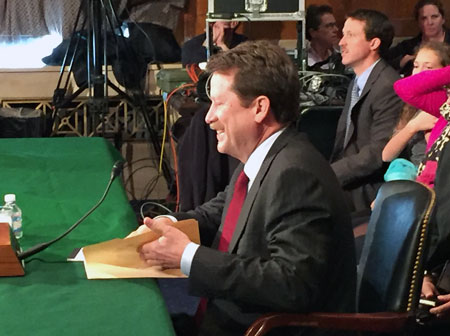FDA Can Help On Drug Prices – Except When It Can't, Califf Says
This article was originally published in The Pink Sheet Daily
Executive Summary
Commissioner nominee tells Senate that faster approvals of cheap products and quicker development of innovative ones will reduce pricing pressure; 'monopoly' positions are a concern, but Califf draws the line when asked about drug importation.
Sen. Lamar Alexander, R-Tenn., was eager to ask FDA commissioner nominee Robert Califf about drug prices during his confirmation hearing – so eager that the HELP Committee chairman almost forgot to let Califf make an opening statement.
Alexander recovered quickly, allowed Califf his introductory five minutes, and then again launched into an inquiry about ANDA review times, which had been increasing despite the injection of industry user fees.
The episode set the tone for the rest of the Nov. 17 hearing: tough, substantive questions from both sides of the aisle that were well parried by Califf, who joined FDA from Duke in February and was widely expected to be the next commissioner even before his nomination in September.
Overall, Califf delivered a solid, surprise-free performance that should help secure his confirmation (see related story, (Also see "Califf Supports Combo Products Pathway At Confirmation Hearing" - Pink Sheet, 17 Nov, 2015.)).
The biggest sparks of the day were generated by Sen. Bernie Sanders, I-Vt. The presidential candidate arrived at the hearing after it began and then got dispensation from colleagues to move up in the queue for questioning so he could return to his "extracurricular activities," as Alexander put it.
All Smiles
Califf seems happy at the Senate confirmation hearing. That afternoon, he told a conference sponsored by Friends of Cancer Research and Brookings Center for Health Policy that appearing before Congress "is a little exhausting. … I don't know how Hillary did it for 11 hours."
Photo by Derrick Gingery
Before Sanders got the mic, Califf had been asked several times about drug pricing issues before, including questions from Sen. Bill Cassidy, R-La., who want to know why compounded versions of Turing Pharmaceuticals AG's Daraprim (pyrimethamine) seemed like they would be available before generic versions would be.
Turing's 5,000% price increase for the antiparasitic used by AIDS patients sparked the current debate about during pricing, and while public outcry over the sales strategy hasn't produced any policy changes as of yet, it has still had a profound effect, delaying the development of FDA reform legislation in the Senate and putting the entire Rx industry on the defensive (Also see "Duck And Cover: PhRMA, BIO And GPhA Respond To Turing Pricing Debacle" - Pink Sheet, 28 Sep, 2015.).
Cassidy said that Turing and Valeant Pharmaceuticals International Inc. "abuse the social contract, which gives you a reasonable rate of return for drug marketing, and they've gone way beyond reasonable." His comments underscore the political peril for industry: even a Republican senator is questioning whether companies should have free rein to set their prices.
Regarding the lag time between compounded drugs and generics, Califf noted that circumstances of every product was unique and that he would have to get back to Cassidy on the specifics.
Califf made his case for what FDA could do on drug pricing most succinctly during questions from Senator Al Franken, D-Minn. Pivoting from a question on device oversight, Califf said "when it comes to cost, we do have some tools we can use to help out."
FDA is "doing everything we can to do a good job with the generic drug situation," Califf said, noting that 88% of prescriptions dispensed are for generics, "which is a good thing. But we now also have biologics, and biosimilars are now coming up and we have over 50 applications in the works," he said.
"One other which is very important to me which people normally wouldn't think about that much – but I think is going to come up more and more – is that if we really fix our evidence generation system, that is streamlining clinical trials, getting the data that we need, people wouldn't spend money on expensive drugs when they are not needed. … We need to have better information and I think we can do that."
Preventing drug shortages also keeps drug costs down, Califf said.
"The new area that we've got to work on is when someone gets a monopoly, which is what several of you have referred to, is understanding who the competitors are and making sure that they are doing the right things to be able to compete and get their products on the market," he said.
If We Can Import Food, Why Not Drugs?
A few minutes later it was Sanders' turn to speak, and he delivered his questions with his signature high-volume intensity.
Sanders had already announced that he would oppose Califf because of his connections to industry (Also see "Califf Nomination Hearing Expected Before Holiday Season" - Pink Sheet, 9 Oct, 2015.), and he focused most of his time on broader policy issues, rather than Califf's work with product sponsors.
Sanders asked if the pharmaceutical industry's lobbying efforts and campaign contributions, which he pegged at $250m in 2014, influenced drug prices. Califf said, "I think the ideal situation would be if the money went into R&D to develop an adequate picture of the risks and benefits of treatment."
Noting that "we import lettuce and tomato, vegetables from farms all over the world, but somehow we cannot reimport from Canada brand name prescription drugs manufactured by the largest drug companies of the world," Sanders pressed Califf on the issue.
"We have major concerns about reimportation, the system it would take – " Califf said, and was cut off by Sanders.
"In other words, you think we can bring in fish products and vegetables from farms all over the world, but we cannot bring from across the Canadian border brand-name drugs. You don't think we have the capability of doing that?"
Califf replied, "We have the capability, it would add additional cost and systems would – "
Sanders again cut in again. "This is why precisely the American people are paying by far the highest prices for prescription drugs in the world."
Califf was calm in his response to Sanders, but his answers were the tersest of the hearing. Even when he was being grilled on fish naming policy a few minutes later by Sen. Lisa Murkowski, R-Alaska, Califf offered a courteous "I enjoyed my visit with you," referring to his sit-down with the senator in advance of the hearing, while also making it clear that FDA wasn't necessarily going to prohibit pollock from Russia being labeled "Alaska Pollock."
If Califf had enjoyed his earlier meeting with Sanders, he didn't betray it during the hearing. Califf – and industry – can only hope that the climax of his hearing is also the high water mark of the drug importation debate for a while.
